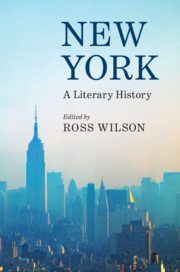Book contents
- New York: A Literary History
- New York
- Copyright page
- Contents
- Contributors
- Acknowledgements
- Chapter 1 Introduction
- Part I Adaptation and Adjustment
- Chapter 2 Changing Culture
- Chapter 3 Agitators and Intellectuals
- Chapter 4 The Mirror of the West
- Chapter 5 Writing the Big Apple in Chinese and Chinese American Literature
- Part II Innovation and Inspiration
- Part III Identity and Place
- Part IV Tragedy and Hope
- Bibliography
- Index
Chapter 2 - Changing Culture
The Contribution of European Immigrants to New York City Literature, 1870–1940
from Part I - Adaptation and Adjustment
Published online by Cambridge University Press: 19 February 2020
- New York: A Literary History
- New York
- Copyright page
- Contents
- Contributors
- Acknowledgements
- Chapter 1 Introduction
- Part I Adaptation and Adjustment
- Chapter 2 Changing Culture
- Chapter 3 Agitators and Intellectuals
- Chapter 4 The Mirror of the West
- Chapter 5 Writing the Big Apple in Chinese and Chinese American Literature
- Part II Innovation and Inspiration
- Part III Identity and Place
- Part IV Tragedy and Hope
- Bibliography
- Index
Summary
This comprehensive look at the New York literature of European immigrants invites us to rethink in aesthetic terms the interaction between the psychic and the socio-historical. A closer look at the literary dimension of the Irish, German, Scandinavian and Dutch, Italian, Jewish, Polish, Greek, and other components of New York raises the question of the specificity whereby immigrant authors, or second-generation authors with a strong, obvious immigrant background, related to, and portrayed a city, and a city like no other such as New York. Mass immigration meant the almost perfect concentration in the New York of that period of the three classical dramatic unities of time, place and action, thus giving evidence to an epochal change that was at the same time external and internal, socio-political and existential, and whose effects are palpably present in the immigrants’ literature. The massive global inflows from Castle Garden and Ellis Island happened because, and coincided with, a tumultuous industrial, economic and capitalist thrust, and caused a gigantic urban growth. To be sure, this was a phenomenon of obviously global dimensions, which concurred and vied with the aggressive nationalistic mind-set of the time and became an active element of a push and pull dynamic. Indeed, ‘in a multitude of ways each immigrant culture articulated group identity as national identity’.
- Type
- Chapter
- Information
- New YorkA Literary History, pp. 19 - 30Publisher: Cambridge University PressPrint publication year: 2020



